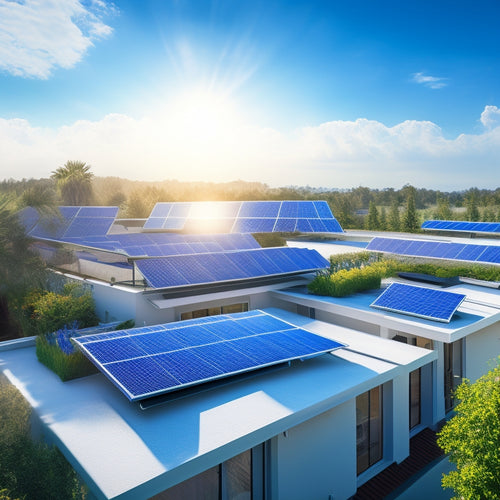
Applications of Solar Electricity
Share
You're already utilizing the power of solar electricity in various aspects of your life. From residential systems that reduce energy bills by up to 50% to commercial solutions that provide stable power supply during high demand or outages, solar energy is making a significant impact. In industrial settings, it minimizes risks of outages and downtime, while in agriculture, it supports sustainable practices and reduces operating costs. Remote areas, transportation, and electric vehicles also benefit from solar energy. As you investigate the many applications of solar electricity, you'll uncover even more ways it's changing the way you live and work.
Key Takeaways
- Solar electricity powers residential homes, reducing energy bills by up to 50% and providing backup power during outages.
- Commercial solar energy solutions reduce reliance on the grid, leading to significant energy savings and stable power supply.
- Industrial power generation needs are met with large-scale solar installations, minimizing risks of outages and downtime.
- Solar-powered irrigation pumps enhance water conservation and reduce operating costs for agricultural applications.
- Remote area electrification projects, including island power systems and village electrification schemes, provide energy independence and access to essential services.
Residential Solar Power Systems
With the cost of traditional energy sources rising and concerns about climate change mounting, many homeowners are turning to residential solar power systems as a clean, efficient, and cost-effective alternative.
You'll benefit from net metering, which allows you to generate your own electricity and export any excess to the grid, offsetting your energy consumption.
Solar incentives, such as tax credits and rebates, can greatly reduce installation costs, making it more accessible.
You'll also appreciate the energy efficiency of solar power, which can reduce your energy bills by up to 50%.
Furthermore, energy storage systems can be integrated into your setup, providing backup power during outages.
System maintenance is relatively low, with most systems requiring only occasional cleaning and inspection.
Financing options are available, including loans and power purchase agreements, to help you get started.
Commercial Solar Energy Solutions
Step up to the benefits of commercial solar energy solutions, which can catapult your business into a more sustainable and cost-effective operation.
By utilizing solar power, you can reduce your reliance on the grid and enjoy significant savings on your energy bills. With solar leasing options, you can deploy commercial solar energy solutions without upfront capital expenditures.
You'll also benefit from energy storage systems that guarantee a stable power supply during periods of high demand or grid outages.
Commercial rooftops offer ample space for solar integration, allowing you to maximize your energy yield while minimizing your carbon footprint.
Take advantage of solar incentives and renewable partnerships to further reduce your costs. A power purchase agreement can provide a fixed, predictable energy rate, shielding you from market volatility.
Industrial Power Generation Needs
Your industrial operation relies heavily on a consistent and reliable power supply to maintain production levels, meet demand, and guarantee business continuity. Any disruptions or power outages can result in significant losses and downtime. This is where solar energy comes in as a viable alternative to traditional power sources. With large scale installations, you can generate the power you need to run your operation while reducing your carbon footprint.
| Benefits | Description |
|---|---|
| Reliability | Solar energy provides a consistent power supply, reducing the risk of power outages and downtime. |
| Scalability | Large scale installations can be designed to meet your specific power generation needs. |
| Energy Storage | Solar energy storage systems secure a stable power supply even during periods of low sunlight. |
| Cost Savings | Solar energy can reduce your energy costs, providing a significant return on investment. |
| Environmental | Solar energy is a clean and renewable source of power, reducing your operation's carbon footprint. |
Agricultural Irrigation Pumps Systems
Solar-powered irrigation pumps are becoming an increasingly popular solution for farmers and agriculturalists seeking to reduce their reliance on fossil fuels and lower their operating costs. By utilizing the power of the sun, you can greatly reduce your energy expenses and carbon footprint, while increasing your agricultural productivity.
Solar irrigation pumps offer a reliable and efficient way to manage your crop management, ensuring ideal water conservation and sustainable farming practices.
With pump automation, you can remote-monitor and control your irrigation systems, ensuring that your crops receive the right amount of water at the right time. This not only saves you time and resources but also enables you to make data-driven decisions for optimal crop yields.
Renewable agriculture is no longer a distant dream, and with solar-powered irrigation pumps, you can achieve energy efficiency while reducing your environmental impact. By adopting solar irrigation, you'll be contributing to a sustainable future for generations to come.
Remote Area Electrification Projects
You'll find that solar electricity is particularly well-suited for remote area electrification projects, which often involve installing island power systems or village electrification schemes.
These off-grid energy access solutions are ideal for regions where traditional grid connections are impractical or non-existent.
Island Power Systems
Reliability is paramount in remote area electrification projects, where island power systems serve as a lifeline for communities living off the grid.
As you consider powering an island community, you need a system that can withstand harsh weather conditions, provide consistent energy supply, and be easy to maintain.
Island power systems, leveraging solar energy, offer a strong and sustainable solution.
Here are three key benefits of island power systems:
-
Energy independence: Island power systems, powered by solar microgrids, reduce reliance on diesel generators and imported fuels, giving you control over your energy supply.
-
Lower operating costs: Solar energy reduces fuel consumption, lowering operating costs and minimizing environmental impact.
-
Improved energy access: Island power systems can provide electricity to remote communities, supporting economic development, healthcare, and education.
Village Electrification Schemes
In remote and rural areas, village electrification schemes have become a guiding source of hope for communities struggling to access basic amenities.
You're likely familiar with the challenges of rural electrification, where traditional grid extension is often impractical due to distance, terrain, or cost. That's where solar power comes in.
Community solar initiatives, energy cooperatives, and solar microgrids offer decentralized solutions customized to local needs. By leveraging solar power incentives, these projects can be economically viable and environmentally sustainable.
Rural electrification is a vital step towards sustainable development, enabling communities to power homes, schools, healthcare facilities, and local businesses.
Solar microgrids, in particular, provide reliable and efficient energy distribution, often with built-in energy storage.
As you investigate village electrification schemes, consider the potential for solar power to reshape the lives of millions living in remote areas.
With careful planning, these projects can become lighthouses of sustainable development, illuminating a path towards energy access and economic growth.
Off-Grid Energy Access
As village electrification schemes spotlight the potential of solar power, off-grid energy access projects emerge as a natural extension, tackling the unique challenges of remote area electrification.
You're likely familiar with the limitations of traditional grid extension, which often prove costly and impractical for remote communities. Off-grid energy access projects offer a viable alternative, leveraging solar power to provide reliable, clean energy to these areas.
These projects typically involve the deployment of decentralized solar systems, often paired with solar battery storage, to guarantee a stable power supply. To facilitate the growth of off-grid energy access, governments and organizations are implementing supportive renewable energy policies, such as tax incentives and subsidies.
Some key benefits of off-grid energy access projects include:
-
Energy independence: Remote communities can generate their own power, reducing reliance on diesel generators and imported fuels.
-
Cost savings: Solar power can provide a more economical solution compared to traditional grid extension or fossil fuel-based generation.
-
Environmental benefits: Off-grid energy access projects promote the adoption of clean, renewable energy, reducing greenhouse gas emissions and mitigating climate change.
Transportation and Electric Vehicles
About 20% of global greenhouse gas emissions originate from the transportation sector, making it a prime target for electrification. You can play a significant role in reducing these emissions by adopting solar-powered transportation solutions.
Electric mobility is gaining traction, and you can be at the forefront of this revolution by investing in solar charging infrastructure. Renewable transportation is the way forward, and you can make a difference by switching to eco-friendly transit options.
Sustainable logistics rely heavily on green fleets, which can be powered by solar energy. Vehicle electrification is becoming increasingly popular, and you can capitalize on this trend by investing in solar-powered public transport.
Clean energy vehicles are the future, and you can be part of this movement by adopting solar-powered transportation solutions. With the right solar infrastructure in place, you can reduce your carbon footprint and contribute to a cleaner environment.
Frequently Asked Questions
Can Solar Electricity Be Used for Cooking and Heating?
You can utilize solar electricity for cooking and heating by utilizing solar cooking technologies and integrating them with heating systems, allowing you to tap into the sun's energy for your daily needs.
Is Solar Power Suitable for Areas With Frequent Power Outages?
You're wondering if solar power is suitable for areas with frequent power outages. The answer is yes, as off-grid solutions provide renewable reliability, ensuring a steady supply of electricity even when the grid fails, making it an ideal choice for areas prone to outages.
Are Solar Panels Affected by Pollution and Dust?
You're wondering if pollution and dust will sabotage your solar panel's performance - and the answer is, yes, they can. Dust accumulation reduces energy output, making regular solar panel maintenance essential to guarantee maximum energy utilization.
Can I Use Solar Electricity to Charge My Phone?
You can capture the sun's energy to charge your phone using portable chargers equipped with solar batteries, which convert sunlight into electrical energy, allowing you to power up on-the-go, anywhere, anytime.
Are There Any Government Incentives for Solar Electricity Adoption?
You're saving the planet, but who's saving you? Luckily, the government is! You're eligible for federal tax credits and state rebates, offsetting your solar investment. You're not only powered by the sun, but also by sweet, sweet incentives.
Related Posts
-

Why Electric Motorcycles Fail at Long-Distance Touring
You're likely familiar with the excitement of hitting the open road on an electric motorcycle, but you're also smart ...
-

What Makes a Road Bike-Friendly by Design?
As you plan and design roads, incorporating features like dedicated bike lanes, smooth surfaces, and traffic calming ...
-

Best Solar Panel Options for Maximum Energy Savings
You can maximize your energy savings with solar panels that boast efficiency ratings above 20%, paired with extensive...


